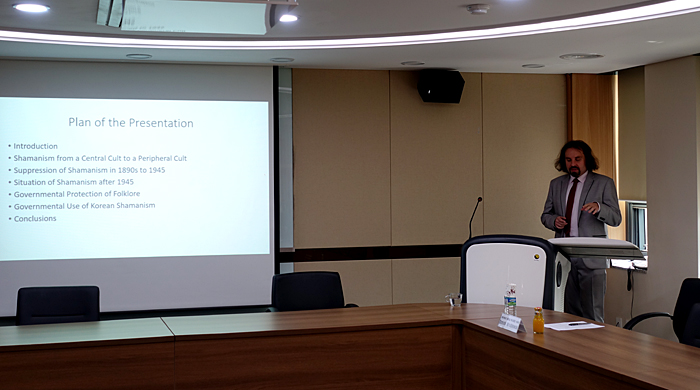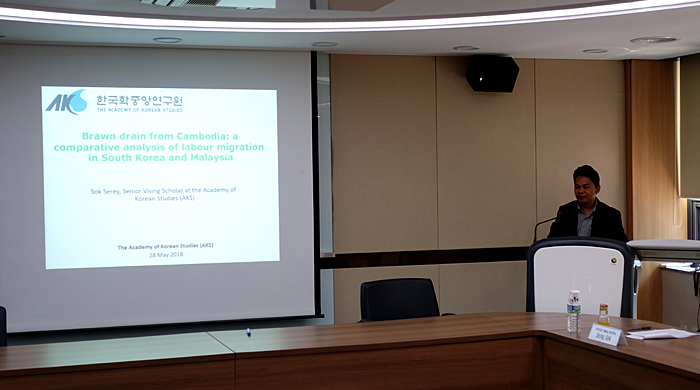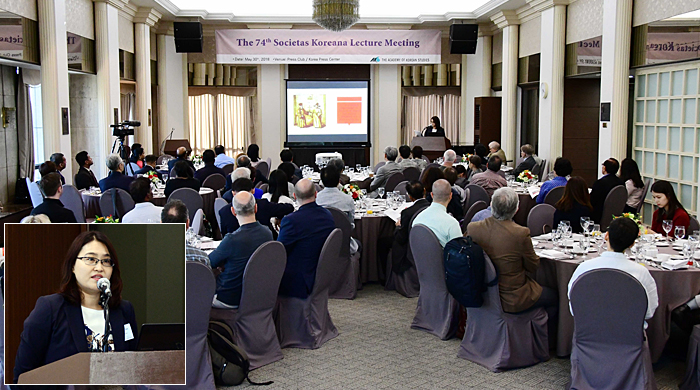CEFIA News
● Fellowship for Textbook Specialists of Kenya
● The 149th Colloquium on Korean Studies Abroad
● The 150th Colloquium on Korean Studies Abroad
● The 74th Societas Koreana Lecture Meeting
● The 149th Colloquium on Korean Studies Abroad
● The 150th Colloquium on Korean Studies Abroad
● The 74th Societas Koreana Lecture Meeting
Fellowship for Textbook Specialists of Kenya

The Center for International Affairs of the Academy of Korean Studies recently hosted “Fellowship for Textbook Specialists of Kenya” from May 13 to 19, 2018. The training session was attended by representatives from the Kenya Institute of Curriculum Development (KICD), a major educational institution of Kenya.
At the textbook seminar, the participants from division of understanding Korea Project and the visitors from Kenya promised to discussed the educational curricula and textbooks of the two countries; ways in which Korea and potential subjects about Korea could be introduced in Kenyan textbooks, and the possible establishment of procedures for including subjects on Korea in Kenyan textbooks.
At the textbook seminar, the participants from division of understanding Korea Project and the visitors from Kenya promised to discussed the educational curricula and textbooks of the two countries; ways in which Korea and potential subjects about Korea could be introduced in Kenyan textbooks, and the possible establishment of procedures for including subjects on Korea in Kenyan textbooks.

The visitors from Kenya attended lectures on political development (North and South Korea relations), history and culture, and economic growth. They also had the opportunity to broaden their understanding of Korean history and culture during a tour that took in the Daereungwon Ancient Tombs, Bulguksa Temple and Seokguram Grotto in Gyeongju, Gyeongbokgung Palace and Hanok Village in Seoul, and the POSCO (Pohang Iron and Steel Company) industrial site, as well as attending a Korean traditional performing arts performance.
During the program, the textbook specialists from Kenya were able to increase their interest in and understanding of the education system, economy, history and culture of Korea. The participants from division of understanding Korea Project and the visitors from Kenya promised to make continuous efforts to promote mutual understanding between students in Korea and Kenya through textbooks and other materials on the two countries.
During the program, the textbook specialists from Kenya were able to increase their interest in and understanding of the education system, economy, history and culture of Korea. The participants from division of understanding Korea Project and the visitors from Kenya promised to make continuous efforts to promote mutual understanding between students in Korea and Kenya through textbooks and other materials on the two countries.
The 149th Colloquium on Korean Studies Abroad

The 149th Colloquium on Korean Studies Abroad was held at the conference room in 2F Munhyeonggwan, the Academy of Korean Studies at 2 pm on May 21, 2018.
Dominik Wroblewski, a PhD candidate at the University of Lodz, gave a presentation on the subject “South Korean Government’s Policy towards Korean Shamanism: Muism.”
Mr. Wroblewski discussed various aspects of the South Korean government’s policy on shamanism and proposed directions for the future. Researchers visiting Korea and students graced the occasion with their presence.
Dominik Wroblewski, a PhD candidate at the University of Lodz, gave a presentation on the subject “South Korean Government’s Policy towards Korean Shamanism: Muism.”
Mr. Wroblewski discussed various aspects of the South Korean government’s policy on shamanism and proposed directions for the future. Researchers visiting Korea and students graced the occasion with their presence.
The 150th Colloquium on Korean Studies Abroad

The 150th Colloquium on Korean Studies Abroad was held at the conference room in 2F Munhyeonggwan, the Academy of Korean Studies at 2 pm on May 28, 2018.
Serey Sok gave a presentation on the subject “Brawn drain from Cambodia: A comparative analysis of labour migration in South Korea and Malaysia.”
In an interview with the Korean media, Serey Sok discussed Cambodian labor migration in Korea. The speaker compared the background, working environment, and wage of Cambodian worker in Korea with those in Malaysia. Researchers visiting Korea and students graced the occasion with their presence.
Serey Sok gave a presentation on the subject “Brawn drain from Cambodia: A comparative analysis of labour migration in South Korea and Malaysia.”
In an interview with the Korean media, Serey Sok discussed Cambodian labor migration in Korea. The speaker compared the background, working environment, and wage of Cambodian worker in Korea with those in Malaysia. Researchers visiting Korea and students graced the occasion with their presence.
The 74th Societas Koreana Lecture Meeting

At 17:30, May 30, 2018, the 74th Societas Koreana Lecture Meeting was held in the Press Club of the Press Center in Seoul. Around eighty foreign opinion leaders living in Korea, including foreign officials and researchers, attended the conference to listen to the lecture delivered by Professor Son Su-yeong (Cornell University) titled “Did Printing Technology Change Chosŏn Society? Korean Printing and Book Culture from a Comparative Perspective”.
During the lecture, Professor Son explained the development of printing and book culture in Korea, which published Jikji (1377), the world’s oldest book printed with movable metal types. Also, by comparing printing culture and the history of its development in the East and the West, he emphasized the importance of printing technology in Joseon society. During the lecture conference, the participants had an opportunity to learn about the impact of the printing technology, which is regarded as one of the most important inventions in human history, on the development of Joseon and East Asian societies.
During the lecture, Professor Son explained the development of printing and book culture in Korea, which published Jikji (1377), the world’s oldest book printed with movable metal types. Also, by comparing printing culture and the history of its development in the East and the West, he emphasized the importance of printing technology in Joseon society. During the lecture conference, the participants had an opportunity to learn about the impact of the printing technology, which is regarded as one of the most important inventions in human history, on the development of Joseon and East Asian societies.

